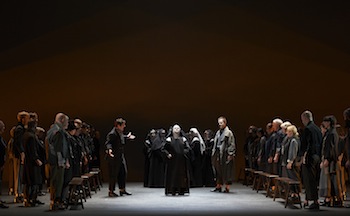The Canadian Opera Company presents Poulenc’s Dialogues des Carmélites at Toronto’s Four Seasons Centre
The Canadian Opera Company is closing its 2012-13 season with French composer Francis Poulenc’s 1956 opera Dialogues des Carmélites. The opera tells the story of an order of Carmelite nuns who were guillotined during the French Revolution for refusing to renounce their faith and hence became religious martyrs.
It was my first time seeing a Poulenc opera. Carmélites is mostly sung in recitative (talk-singing); the score has an almost liturgical quality to it and by that I mean it’s often as rigid, dour and morose as a Catholic mass. Poulenc goes as far as to include Latin religious text in the libretto.
It was all a bit much for this ex-Catholic to take in and I found the overtly religious themes of this opera off-putting to the point where it hindered my ability to connect with the characters and enjoy it.
Carmélites centers on the character of Blanche de la Force played in this production by Canadian soprano Isabel Bayrakdarian. The daughter of a Marquis, Blanche is a hopelessly sheltered yet annoyingly sanctimonious little rich girl. Blanche is unable to cope with her (by all accounts relatively easy) life and decides to run off to join the order of Carmelite nuns. She doesn’t necessarily make for a compelling or sympathetic lead character by any means.
Director Robert Carsen and set designer Michael Levine create a stark, minimalist world for the staging of the opera. The production looks very spare; there is no set and limited use of props. Instead, Carsen opts to use supernumeraries, often filling the stage with dozens of them, to create a sort of human scenery. The effect is especially striking in the later scenes when the revolutionaries are descending on the nuns’ convent but at other times the stage looks bare.
Maestro Johannes Debus and the Canadian Opera Company Orchestra attack the score with vigor although at times I found that the orchestra overpowered the singers a bit. I especially had trouble hearing tenor Frédéric Antoun in the role of the Chevalier de la Force over the orchestra.
The highlight of the opera for me was Mezzo-soprano Judith Forst in the role of Madame de Croissy, the first Prioress (Mother Superior) of the order who takes Blanche under her wing then promptly dies in a fit of illness-induced insanity, renouncing God in the process. It’s a delicious scene and Forst plays it with all the drama and intensity it warrants but never takes it over the top. In the end she makes the old nun surprisingly sympathetic.
However, the first Prioress’ death scene takes a back seat to the opera’s finale in which the nuns are spread out in formation across the stage singing in unison and performing a slow, graceful choreography as the sounds of the guillotine blade pierce the air and one by one the nuns fall. It’s a beautifully-staged, incredibly dramatic climax and I was told it would be a real tear-jerker but I remained oddly unaffected by it.
I suspect the scene only has emotional resonance if you believe that the idea of martyrdom is noble. However, living in a secular society in a post-9/11 world I guess I take deep umbrage to works that glorify the concept of religious martyrdom.
So I guess in the end, Dialogues des Carmélites didn’t make me feel so much as it made me think; even if it doesn’t stir the soul it’s at least good food for thought.
Details:
- Dialogues des Carmélites is playing through May 25, 2013 at the Four Seasons Centre for the Performing Arts (145 Queen St. W.)
- Consult the schedule for show times.
- Tickets $12 – $325
- Tickets are available in person at the Four Seasons Centre for the Performing Arts box office (145 Queen St. W.), by phone at 416-363-8231 or online at coc.ca.
Photo credit:
– Photo by Michael Cooper

